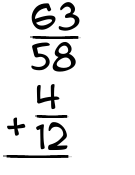What is 63/58 + 4/12?

|
Here's how we add
|
|||||||||||||||||||||||||
Step 1We still have different denominators (bottom numbers), though, so we need to get a common denominator. This will make the bottom numbers match. Multiply the denominators together first. Now, multiply each numerator by the other term's denominator. Now we multiply 63 by 12, and get 756, then we multiply 58 by 12 and get 696. Now for the second term. You multiply 4 by 58, and get 232, then multiply 58 by 12 and get 696. This gives us a new problem that looks like so:
|
|||||||||||||||||||||||||
Step 2Since our denominators match, we can add the numerators. 756 + 232 = 988 That gives us an answer of
|
|||||||||||||||||||||||||
Step 3Can this fraction be reduced? First, we attempt to divide it by 2... Are both the numerator and the denominator evenly divisible by 2? Yes! So we reduce it:
So far so good... let's try to divide by that number again. Are both the numerator and the denominator evenly divisible by 2? Yes! So we reduce it:
So far so good... let's try to divide by that number again. No good. So next you try the next prime number, which is 3... No good. So next you try the next prime number, which is 5... No good. So next you try the next prime number, which is 7... No good. So next you try the next prime number, which is 11... No good. So next you try the next prime number, which is 13... No good. So next you try the next prime number, which is 17... No good. So next you try the next prime number, which is 19... No good. So next you try the next prime number, which is 23... No good. So next you try the next prime number, which is 29... No good. So next you try the next prime number, which is 31... No good. So next you try the next prime number, which is 37... No good. So next you try the next prime number, which is 41... No good. So next you try the next prime number, which is 43... No good. So next you try the next prime number, which is 47... No good. So next you try the next prime number, which is 53... No good. So next you try the next prime number, which is 59... No good. So next you try the next prime number, which is 61... No good. So next you try the next prime number, which is 67... No good. So next you try the next prime number, which is 71... No good. So next you try the next prime number, which is 73... No good. So next you try the next prime number, which is 79... No good. So next you try the next prime number, which is 83... No good. So next you try the next prime number, which is 89... No good. So next you try the next prime number, which is 97... No good. So next you try the next prime number, which is 101... No good. So next you try the next prime number, which is 103... No good. So next you try the next prime number, which is 107... No good. So next you try the next prime number, which is 109... No good. So next you try the next prime number, which is 113... No good. So next you try the next prime number, which is 127... No good. So next you try the next prime number, which is 131... No good. So next you try the next prime number, which is 137... No good. So next you try the next prime number, which is 139... No good. So next you try the next prime number, which is 149... No good. So next you try the next prime number, which is 151... No good. So next you try the next prime number, which is 157... No good. So next you try the next prime number, which is 163... No good. So next you try the next prime number, which is 167... No good. So next you try the next prime number, which is 173... No good. So next you try the next prime number, which is 179... No good. 179 is larger than 174. So we're done reducing. And we're done! Here's the final answer to 63/58 + 4/12
|